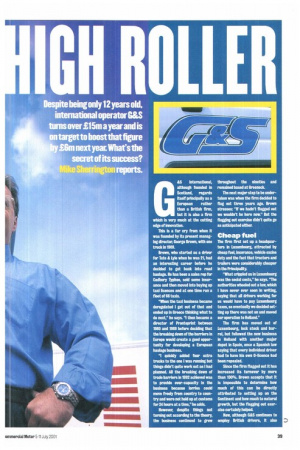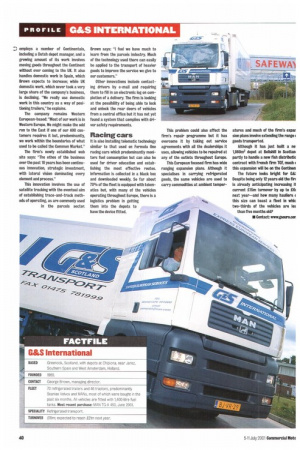I BILLER
Page 39

Page 40

If you've noticed an error in this article please click here to report it so we can fix it.
Despite being only 12 years old, international operator MS turns over 115m a year and is on target to boost that figure ,E6m next year. What's the secret of its success? e Sherrington mons.
G&S International, although founded in Scotland, regards itself principally as a European rather than a British firm, but it is also a firm which is very much at the cutting edge of innovation.
This is a far cry from when it was founded by its present managing director, George Brown, with one truck in 1989.
Brown, who started as a driver for Tate & Lyle when he was 21, had an interesting career before he decided to get back into road haulage. lie has been a sales rep for Cadbury Typhoo, sold some insurance and then moved into buying up taxi licences and at one time ran a fleet of 69 taxis.
"When the taxi business became deregulated I got out of that and ended up in Greece thinking what to do next," he says. "I then became a director of Prontoprint between 1980 and 1989 before deciding that the breaking down of the barriers in Europe would create a good opportunity for developing a European haulage business.
"I quickly added four extra trucks to the one I was running but things didn't quite work out as I had planned. All the breaking down of trade barriers in 1992 achieved was to provide over-capacity in the business because lorries could move freely from country to country and were not held up at customs for 24 hours at a time," he adds.
However, despite things not turning out according to the theory, the business continued to Vow throughout the nineties and remained based at Greenock.
The next major step to be undertaken was when the firm decided to flag out three years ago. Brown stresses: "If we hadn't flagged out we wouldn't be here now." But the flagging out exercise didn't quite go as anticipated either
Cheap fuel
The firm first set up a headquarters in Luxembourg, attracted by cheap fuel, insurance, vehicle excise duty and the fact that tractors and trailers were considerably cheaper in the Principality.
"What crippled us in Luxembourg was the social costs," he says. "The authorities wheeled out a law, which I have never over seen in writing, saying that all drivers working for us would have to pay Luxembourg taxes, so eventually we decided setting up there was not on and moved our operation to Holland."
The firm has moved out of Luxembourg, lock stock and barrel, but followed the new business in Holland with another major depot in Spain, once a Spanish law saying that every individual driver had to have his own 0-licence had been repealed.
Since the firm flagged out it has increased its turnover by more than 100%. Brown accepts that it is impossible to determine how much of this can be directly attributed to setting up on the Continent and how much to natural growth, but the flagging out exercise certainly helped.
Now, although US continues to employ British drivers, it also employs a number of Continentals, including a Dutch depot manager, and a growing amount of its work involves moving goods throughout the Continent without ever coming to the UK. It also handles domestic work in Spain, which Brown expects to increase; while UK domestic work, which never took a very large share of the company's business, is declining. "We really use domestic work in this country as a way of positioning trailers," he explains.
The company remains Western European-based: Most of our work is in Western Europe. We might make the odd run to the East if one of our 400 customers requires it but, predominantly, we work within the boundaries of what used to be called the Common Market."
The firm's newly established web site says: "The ethos of the business over the past 10 years has been continuous innovation, strategic investment, with lateral vision dominating every element and process."
This innovation involves the use of satellite tracking with the eventual aim of establishing trace-and-track methods of operating, as are commonly used in the parcels sector. Brown says: "I feel we have much to learn from the parcels industry. Much of the technology used there can easily be applied to the transport of heavier goods to improve the service we give to our customers.'' Other innovations include contacting drivers by e-mail and requiring them to fill in an electronic log on completion of a delivery. The firm is looking at the possibility of being able to lock and unlock the rear doors of vehicles from a central office but it has not yet found a system that complies with driver safety requirements.
Racing cars
It is also installing telematic technology similar to that used on Formula One racing cars which predominantly monitors fuel consumption but can also be used for driver education and establishing the most effective routes. Information is collected in a black box and downloaded weekly. So far about 70% of the fleet is equipped with telematics but, with many of the vehicles operating throughout Europe, there is a logistics problem in getting them into the depots to have the device fitted. This problem could also affect the firm's repair programme but it has overcome it by taking out service agreements with all the dealerships it uses, allowing vehicles to be repaired at any of the outlets throughout Europe.
This European focused firm has wide ranging expansion plans. Although it specialises in carrying refrigerated goods, the same vehicles are used to carry commodities at ambient temper
atures and much of the firm's expar sion plans involve extending the range goods transported.
Although it has just built a ne 1,860m2 depot at Bellshill in Scotian partly to handle a new fish distributic contract with French firm Ter, much this expansion will be on the Continen The future looks bright for Get: Despite being only 12 years old the firi is already anticipating increasing ii current £15m turnover by up to 261 next year—and how many hauliers r this size can boast a fleet in whic two-thirds of the vehicles are lee than five months old?
II Contact vnymgseuro.cor












































































































